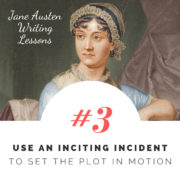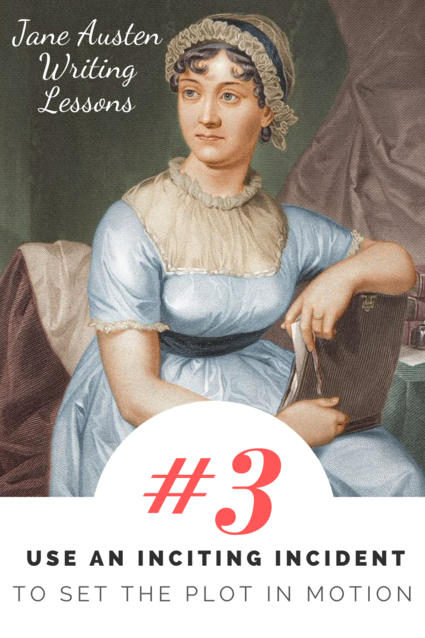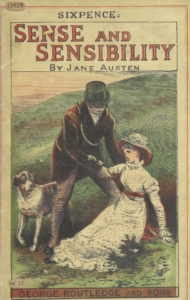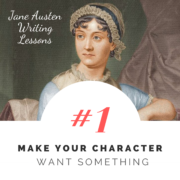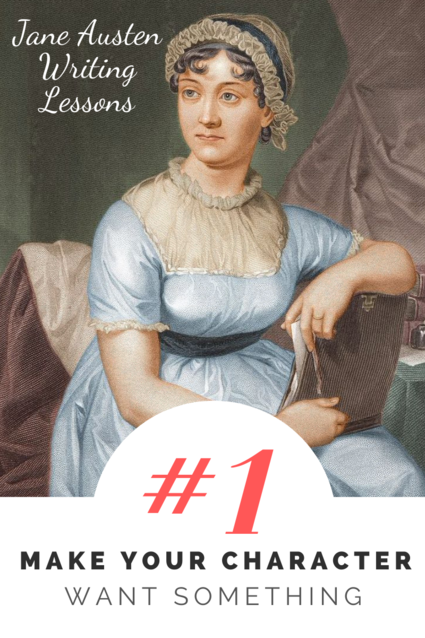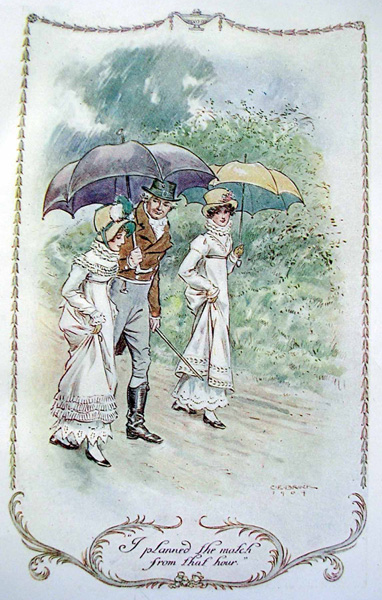#3: Use an Inciting Incident to Set the Plot in Motion
One of my all-time favorite films is Austenland. It’s a comedy about a woman named Jane who spends her savings to stay at an all-inclusive, Jane Austen-themed resort. At one point in the film, she and another character, Mr. Nobley, find themselves running.
Mr. Nobley asks, “Why are we running?”
Jane replies, “Because a man and a woman should never be alone unless they are in motion.”
Just like characters in the Regency period (or anyone in an immersive Jane Austen experience), stories themselves should not be at rest.
Stories are generally about motion, they are about change and development, both in terms of character and plot. Yet as humans, we are stationary beings. We do what we have been doing: we stay still, or, if we have a path, we stick to that path unless something changes.
An inciting incident is an event that carries weight for the main character and creates the opportunity for change, both internally and externally. An inciting incident often introduces forces outside of the main character’s control, and is a disruption that requires the main character to adapt and grow and interact with others in new ways. An inciting incident often relates, in some way, to the main themes or conflicts of the novel.
1884 cover of Sense and Sensibility, from the British Library
In Sense and Sensibility, Mr. Dashwood’s death changes everything for Mrs. Dashwood and her daughters, Elinor, Marianne, and Margaret. Yet for a time, they stay in stasis, continuing to live on the estate that has been their home. Yet it is no longer really their home: Mrs. Dashwood’s stepson, Mr. John Dashwood, and his wife, Fanny Dashwood, are the new owners. Fanny in particular makes the elder Mrs. Dashwood and her daughters unwelcome, especially once she notices that her brother, Edward Ferrars, is interested in Elinor. She rudely confronts Mrs. Dashwood on the subject, and Mrs. Dashwood decides that they will withdraw from the estate:
To quit the neighborhood of Norland was no longer an evil; it was an object of desire; it was a blessing, in comparison of the misery of continuing her daughter-in-law’s guest: and to remove for ever from that beloved place would be less painful than to inhabit or visit it while such a woman was its mistress.
As they leave, Marianne wails a lament:
“Dear, dear Norland! when shall I cease to regret you!—when learn to feel a home elsewhere!—Oh! happy house, could you know what I suffer in now viewing you from this spot, from whence perhaps I may view you no more!….you will remain the same; unconscious of the pleasure or the regret you occasion, and insensible of any change in those who walk under your shade!—But who will remain to enjoy you?”
This forced eviction takes the Dashwoods on a physical journey—to a new county, where they live in a cottage and meet a whole set of new people. In addition to a physical journey, it’s also a journey to try to find home and to see if they can survive losing almost everything that they find dear. This journey starts both Marianne and Elinor on internal journeys; Marianne is full of sensibility and unrestrained emotion, but must learn how to let more than her emotions govern her; Elinor has a bit too much sense, and keeps too much inside her, not allowing herself to want and hope for the things she really desires.
While some inciting incidents lead to physical journeys, like in Sense and Sensibility, a physical journey is not required. For instance, in Emma the inciting incident is the marriage of Emma’s governess. Emma’s internal and external journeys are captivating, but they do not require her to leave her home (the furthest she goes is Box Hill, which is only seven miles away).
Change is at the heart of interesting plots, and the possibility for change is why we root for characters. A good inciting incident sets the plot in motion and paves the way for the rest of the story.
Exercise 1: Choose one of your favorite books or movies. What is the inciting incident? How does this event change things for the main character and start them on a journey? Share your thoughts in the comments.
Exercise 2: In the following paragraph, a character is pursuing something she wants: the opportunity to be the pianist for the high school musical. Add an inciting incident, something that will disrupt and change things for Luciana. For the purposes of this exercise, keep it short—anywhere from a sentence to a full paragraph. Once you’ve written the inciting incident, consider how it would change the character’s trajectory and what sort of story might result from it.
Luciana ran her fingers up and down the keys of an imaginary piano. She had been preparing for this audition for months, and now the time had finally come. She closed the book and looked at her hands. They were warm, they were flexible, and they were ready. She would be chosen as the accompanist for the high school musical this year, surely. She waited impatiently for her turn on the grand piano, but she need not have worried. Luciana played the music flawlessly, and the music director gave her an assuring smile as she left the room.
Exercise 3: Take a new story idea, one that you haven’t yet developed. Spend a few minutes brainstorming an inciting incident, or, if you prefer discovery writing, write an opening scene and see what inciting incident will put your character in motion or change her direction.

